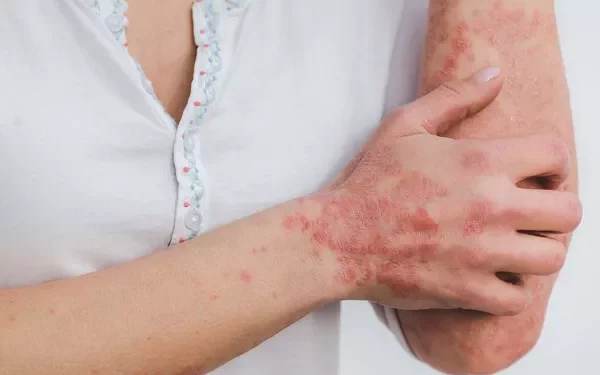Psoriasis is a chronic autoimmune condition that causes rapid skin cell production, leading to thick, red, scaly patches on the skin. Severe psoriasis can significantly affect a person’s quality of life. This article explores the best medications for managing severe psoriasis, their effectiveness, side effects, and additional treatment options.
Understanding Psoriasis
Before diving into medications, it’s essential to understand what psoriasis is and how it affects the body. Psoriasis occurs when the immune system mistakenly attacks healthy skin cells. This results in:
Inflammation: Redness and swelling of the skin.
Scales: Silvery-white patches formed by dead skin cells.
Itching: Many people experience intense itching in affected areas.
Types of Psoriasis
There are several types of psoriasis, but the most common form is plaque psoriasis. Severe psoriasis often involves extensive areas of the body or specific regions like the scalp, elbows, knees, and lower back.
Medication Categories for Severe Psoriasis
Treatments for severe psoriasis fall into three main categories:
- Topical Treatments
- Systemic Treatments
- Phototherapy
1. Topical Treatments
Topical medications are applied directly to the skin. They are often the first line of defense for mild to moderate psoriasis but can also help with severe cases.
a. Corticosteroids
Corticosteroids are the most commonly prescribed topical treatment for psoriasis. They reduce inflammation and slow down skin cell production.
- Examples: Betamethasone, Clobetasol, and Fluocinonide.
- Strengths: These medications come in various strengths, from mild to super potent.
- Use: Apply once or twice daily as directed by a healthcare provider.
Side Effects: Long-term use can lead to skin thinning, stretch marks, and systemic absorption issues.
b. Vitamin D Analogues
These medications help slow down skin cell growth and reduce inflammation.
- Examples: Calcipotriene and Calcitriol.
- Effectiveness: They can be used alone or in combination with corticosteroids for better results.
Side Effects: Mild skin irritation can occur.
c. Retinoids
Topical retinoids are derived from vitamin A and help normalize skin cell growth.
- Example: Tazarotene.
- Use: Often recommended for plaque psoriasis.
Side Effects: May cause dryness, redness, or irritation.
2. Systemic Treatments
Systemic treatments affect the entire body and are typically reserved for moderate to severe psoriasis or when topical treatments fail.
a. Oral Medications
Methotrexate
- Mechanism: Suppresses the immune system and decreases inflammation.
- Effectiveness: Often effective for long-term management.
- Monitoring: Requires regular blood tests to monitor liver function and blood cell counts.
Acitretin
- Mechanism: A retinoid that reduces skin cell production.
- Use: Primarily for severe psoriasis that doesn’t respond to other treatments.
Side Effects: Can cause dry skin, hair loss, and liver toxicity.
Cyclosporine
- Mechanism: An immunosuppressant that reduces immune system activity.
- Effectiveness: Fast-acting; used for short-term management.
Side Effects: Risk of kidney damage and high blood pressure.
b. Biologics
Biologics are a newer class of systemic treatments derived from living cells. They target specific parts of the immune system.
Examples:
- Adalimumab (Humira)
- Etanercept (Enbrel)
- Infliximab (Remicade)
- Ustekinumab (Stelara)
- Secukinumab (Cosentyx)
Effectiveness: Biologics are often very effective for severe psoriasis, providing significant skin clearance and improving quality of life.
Administration: Most are given by injection or infusion.
Side Effects: Risk of infections due to immune suppression, allergic reactions, and potential long-term risks.
3. Phototherapy
Phototherapy involves exposing the skin to ultraviolet light under medical supervision. It can be effective for severe psoriasis.
a. UVB Therapy
- Description: Narrowband UVB therapy is commonly used for psoriasis.
- Effectiveness: Can clear skin lesions effectively when done regularly.
b. PUVA Therapy
- Description: This combines psoralen (a medication) with UVA light.
- Effectiveness: It can be very effective but is generally used for more resistant cases.
Side Effects: Increased risk of skin cancer with prolonged use.
Lifestyle and Home Remedies
While medications are crucial, certain lifestyle changes can also help manage severe psoriasis:
Moisturizers: Regular use of moisturizers can prevent dryness and scaling.
Diet: A healthy diet rich in anti-inflammatory foods can support skin health.
Stress Management: Reducing stress through yoga, meditation, or hobbies can help manage flare-ups.
Finding the Right Medication
Choosing the best medication for severe psoriasis can be challenging. It often requires a combination of treatments tailored to individual needs. Consultation with a dermatologist is crucial for developing an effective treatment plan.
Considerations
Severity of Symptoms: How extensive and severe the psoriasis is can guide treatment choices.
Response to Previous Treatments: Understanding what has or hasn’t worked in the past is essential.
Potential Side Effects: Discussing possible side effects with a healthcare provider can help in decision-making.
Personal Preferences: Consideration of lifestyle and preferences regarding medication types (topical vs. systemic).
Conclusion
Managing severe psoriasis requires a comprehensive approach. The best medication varies based on individual circumstances, including the severity of the condition, previous treatment responses, and personal preferences.
Topical treatments like corticosteroids and vitamin D analogues are essential for mild to moderate cases. For severe cases, systemic medications, particularly biologics, offer promising results. Phototherapy remains a valuable option for many.
It’s crucial to work closely with a healthcare provider to determine the most effective treatment plan. With the right approach, many people with severe psoriasis can achieve significant skin clearance and improved quality of life.
Related topics

























